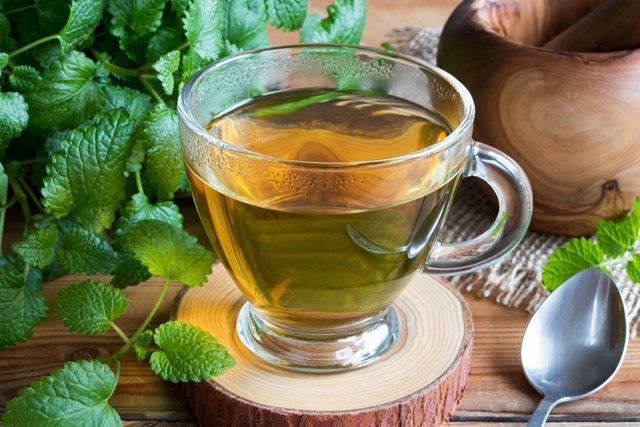Lemon balm tea (Melissa officinalis) provides many health benefits, such as relieving symptoms of stress and anxiety, as well as combating excess gas and pain, such as menstrual cramps and headaches.
These benefits are possible because lemon balm tea contains phenolic compounds, such as rosmarinic acid, citral and geraniol, which have digestive, analgesic, sedative and anti-inflammatory properties. Learn more about the benefits of lemon balm.
Lemon balm tea can be made with the fresh or dried leaves of this plant, and although it is not recommended to replace medicines recommended by your doctor, it helps to complement treatments, as it has many beneficial effects.
What is it for
The main health benefits of lemon balm tea are:
1. Relieves symptoms of stress and anxiety
Lemon balm tea helps alleviate symptoms of stress and anxiety as it contains rosmarinic acid, a phenolic compound that acts on the nervous system and increases the availability of GABA in the brain, a neurotransmitter that promotes relaxation and well-being, decreasing symptoms such as agitation and nervousness.
2. Fight digestive problems
Lemon balm tea combats some digestive problems, such as excess gas, poor digestion and intestinal cramps, because it contains citral, linalool, rosmarinic acid and geraniol, which are bioactive compounds with antispasmodic, analgesic and carminative effects.
3. May Help Control High Blood Pressure
By promoting the relaxation of blood vessels, lemon balm tea can help control high blood pressure, especially in cases of stress. See the best teas recommended for high blood pressure.
However, more research is still needed to prove the benefits of lemon balm tea in controlling blood pressure.
4. Reduces menstrual cramps
Lemon balm tea is a home remedy that helps relieve menstrual cramps, because it has antispasmodic and analgesic properties that reduce pain and contractions of the uterus muscles. Check out more home remedies for menstrual cramps.
5. Helps treat cold sores
When applied directly to the mouth, lemon balm tea helps treat cold sores. This is because this tea contains caffeic, feluric and rosmarinic acid, phenolic compounds that prevent infection, reduce healing time and alleviate symptoms such as itching, tingling, burning, stinging, swelling and redness.
6. Relieves pain
As it contains linalool, rosmarinic acid and citral, which are bioactive compounds with analgesic, relaxing and anti-inflammatory action, lemon balm tea helps to relax muscles, release tension and relax blood vessels, relieving headaches, toothache, muscle pain and stomach pain.
7. Improves sleep quality
Lemon balm tea improves sleep quality as it contains excellent amounts of geraniol, rosmarinic acid and citral, which are bioactive compounds with a calming and sedative action on the central nervous system, promoting relaxation and combating insomnia. See other teas recommended to combat insomnia.
How to make lemon balm tea
Lemon balm tea can be made with the fresh or dried leaves of this plant, or using individual sachets.
Ingredients:
- 1 tablespoon of torn fresh lemon balm leaves;
- 1 cup (tea) of water.
Preparation mode:
Boil water in a pan or kettle. Turn off the heat, add the lemon balm leaves, cover the pan and let it rest for 5 minutes. Then strain and drink while still warm. You can drink up to 3 cups of this tea per day.
Can you drink lemon balm tea every day?
Yes, you can drink lemon balm tea every day. However, it is recommended to drink this tea for up to 2 weeks. If the symptoms to be treated persist for more than 2 weeks, it is recommended to consult a doctor or other health professional specialized in the use of medicinal plants.
Can pregnant women drink lemon balm tea?
As there are still no studies that prove the safety of consuming lemon balm tea during pregnancy, this tea should only be used by pregnant women under the guidance of a doctor.
Possible side effects
Lemon balm tea is safe when consumed for up to 2 weeks at a time and within the maximum recommended daily amount.
However, consuming lemon balm tea for more than 2 weeks and/or in high quantities can decrease heart rate and blood pressure, and cause headache, nausea, vomiting, dizziness and stomach pain.
Who shouldn’t use
Lemon balm tea is not recommended for children under 12 years of age or people who have hypothyroidism, low blood pressure, glaucoma or benign prostate hyperplasia.
Pregnant or breastfeeding women should only consume lemon balm tea under the guidance of a doctor.
As it has a calming effect, drinking lemon balm tea is not recommended during activities that require alertness such as driving or operating machinery.
Additionally, people who are using sedative medications should always talk to a doctor before drinking lemon balm tea.

Sign up for our newsletter and stay up to date with exclusive news
that can transform your routine!
Warning: Undefined array key "title" in /home/storelat/public_html/wp-content/plugins/link-whisper-premium/templates/frontend/related-posts.php on line 12
Warning: Undefined array key "title_tag" in /home/storelat/public_html/wp-content/plugins/link-whisper-premium/templates/frontend/related-posts.php on line 13




